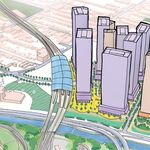China's 100-km traffic jam now in its 10th day, could last 24 more
BEIJING—A massive traffic jam in north China that stretches for 100 kilometres and hit its 10-day mark on Tuesday stems from road construction in Beijing that won't be finished until the middle of next month, an official said.
Bumper-to-bumper gridlock – with vehicles moving little more than a one kilometre a day at one point – has improved since last weekend, said Zhang Minghai, director of Zhangjiakou city's Traffic Management Bureau general office.
Some drivers have been stuck in the jam for five days, China Central Television reported Tuesday. But Zhang said he wasn't sure when the situation along the Beijing-Zhangjiakou highway would return to normal.
The traffic jam started Aug. 14 on a stretch of the highway that is frequently congested, especially after large coalfields were discovered in Inner Mongolia, Zhang said. Traffic volume has increased 40 per cent every year.
Drivers stranded in the gridlock in the Inner Mongolia region and Hebei province, headed toward Beijing, passed the time sleeping, walking around, or playing cards and chess.
Local villagers were doing brisk business selling instant noodles, boxed lunches and snacks, weaving between the parked trucks on bicycles.
Though there were no reports of road-rage violence, drivers complained about price-gouging by villagers who were their only source of food and water. A bottle of water that normally costs 1 yuan (15 cents) was selling for 10 yuan ($1.50), while the price of a 3 yuan- (45 cent-) cup of instant noodles had more than tripled, media reports said.
"A boxed lunch is 10 yuan ($1.50), and one box isn't enough for me," China National Radio cited a driver surnamed Lu as saying. "I'm spending up to 50 yuan (about $7.50) a day on food. It's more expensive than eating in a restaurant."
The highway construction in Beijing that is restricting inbound traffic flow and causing the jam "will not be finished until Sept. 17," Zhang said.
Authorities were trying to speed up traffic by allowing more trucks to enter Beijing, especially at night, Zhang said. They are also asking trucking companies to suspend operations and advised drivers to take alternate routes.
China's roadways are increasingly overburdened as the number of private vehicles booms along with commercial truck traffic hauling materials like coal and food to cities. Traffic slowdowns because of construction and accidents are common, though a 10-day traffic jam is unusual even in China.







